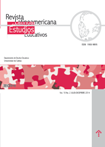Authors
Abstract
The proposal of this article is the divulgation of partial results obtained in a research project about social thinking formation in social sciences teaching and learning. The compressive mode research is founded in a multiple and holistic case study realized with eight pre scholar to fifth grade boys and girls groups of basic education. In every case, the analysis unit is constituted by didactic units in which the social thinking
skills emerging through educative practices are observed, identified, analyzed and interpreted. Through the process it was observed that the most emerging skill is description, what means that students elaborate concepts and statements with qualities, properties and characteristics for the studied phenomena or facts. In the fourth and fifth grades also emerges, although in minor grade, explicative, interpretative and argumentative skills. The research concludes that social thinking formation in traditional education is determined by conventional educative practices, that don’t favors the critical, participative and autonomous citizens formation. This study also reveals, the urgent necessity of the critical transformation of teachers and students by means of reflexive educative practices based in the social dialogue and interaction, that helps to reconfiguration of the educative practice from “what” and “for what” teach and learn social sciences.
References
Benejam, P. y Quinquer, D. (2000). “La construcción del conocimiento social y las habilidades cognitivo-lingüísticas”. En: Jorba, J., Gómez, I. y Prat, Á. (eds.). Hablar y escribir para aprender. Barcelona: Síntesis.
Casas, M., Bosch, D. y González, N. (2005). Las competencias comunicativas en la formación democrática de los jóvenes: describir, explicar, justificar y argumentar. Barcelona: Asociación de Maestros Rosa Sensat.
Dewey, J. (1989). Cómo pensamos: nueva exposición de la relación entre pensamiento y proceso educativo. Barcelona: Paidós.
Dewey, J. (2000). Democracia y educación. Madrid: Morata
Fernández, J., Elórtegui, N., Rodríguez, J.F., Moreno, T. (2002). ¿Cómo hacer unidades didácticas innovadoras? Sevilla: Diada.
Flick, U. (2004). Introducción a la investigación cualitativa. Madrid: Morata.
Gutiérrez, M. (2011). “El pensamiento reflexivo en la enseñanza y el aprendizaje de las ciencias sociales”. Revista Unipluridiversidad, No. 32, pp 83-92. Universidad de Antioquia.
Jorba, J., Gómez, I., Prat, Á. (2000). Hablar y escribir para aprender. El uso de la lengua en situación de enseñanza y aprendizaje desde las áreas escolares. Madrid: Síntesis.
Legardez, A. (2003). “L’enseignement des questions sociales et historiques, socialement vives”. Le Cartable de Clio, No. 3, pp. 245-253.
Levstik, L. (2008). “What happens in social studies classrooms? Research on K-12 social studies practice”. En: Levstik, L. and Tyson, C. (eds). Handbook of research in social studies education. New York: Routledge.
Lipman, M. (1998). Pensamiento complejo y educación. Madrid: La Torre.
Pagés, J. (2004). “La formación del pensamiento social”. En: Benejam, P. y Pagés, J. Enseñar y aprender ciencias sociales, geografía e historia en la educación secundaria. Barcelona: Horsori. Pagés, J. y Santisteban, A. (2011). Les questions socialment vives i lënsenyament de les ciencies socials. Barcelona: Universidad Autónoma de Barcelona.
Pipkin, D. (2009). Pensar lo social. Buenos Aires: La Crujía Ediciones.
Prats, J. (2011). Geografía e historia. Complementos de formación disciplinar. Barcelona: Grao.
Santisteban, A. y Pagés, J. (2011). Didáctica del conocimiento del medio social en la educación primaria. Ciencias sociales para aprender, pensar y actuar. Madrid: Síntesis.
Secrertaria de Educación municipal de Pereira. (2012). “Estadística y desempeño de las instituciones educativas, año 2012”. En: ttp://www.pereiraeduca.gov.co/index.php/ sisgestion.
Strauss, A. y Corbin, J. (2002). Bases de la investigación cualitativa. Medellín: Universidad de Antioquia.
Vigotsky, L. (1989). Pensamiento y lenguaje. Buenos Aires: La Pléyade.
Wasserman, S. (2006). El estudio de casos como método de enseñanza. Buenos Aires: Amorrortu.
Yin, R. (2009). Case study research: design and methods. Fourth edition. California: Sage Publications, Inc

 PDF (Español)
PDF (Español)
 FLIP
FLIP



















